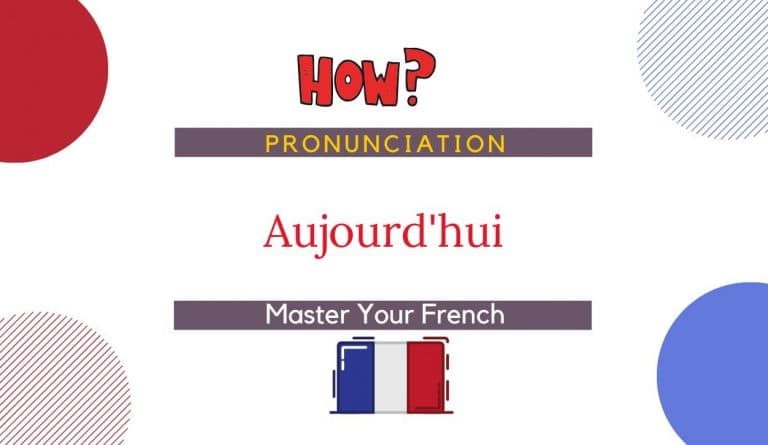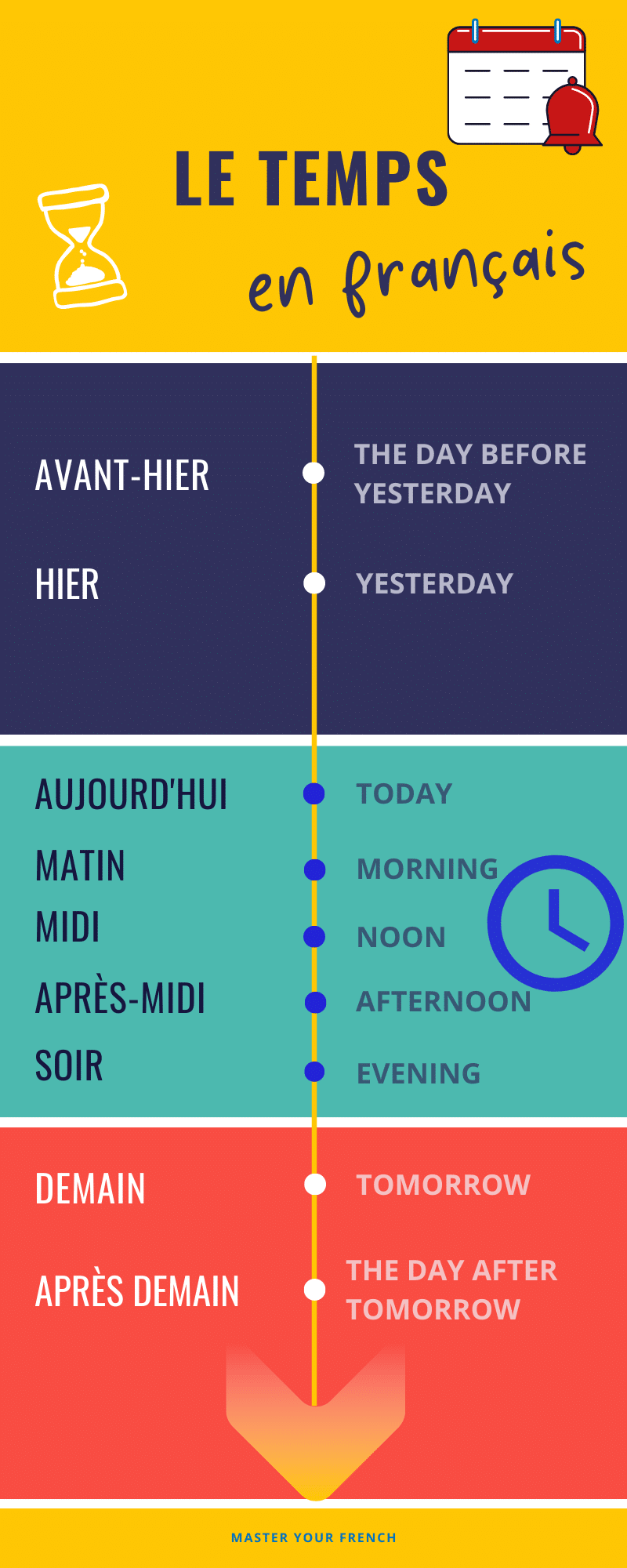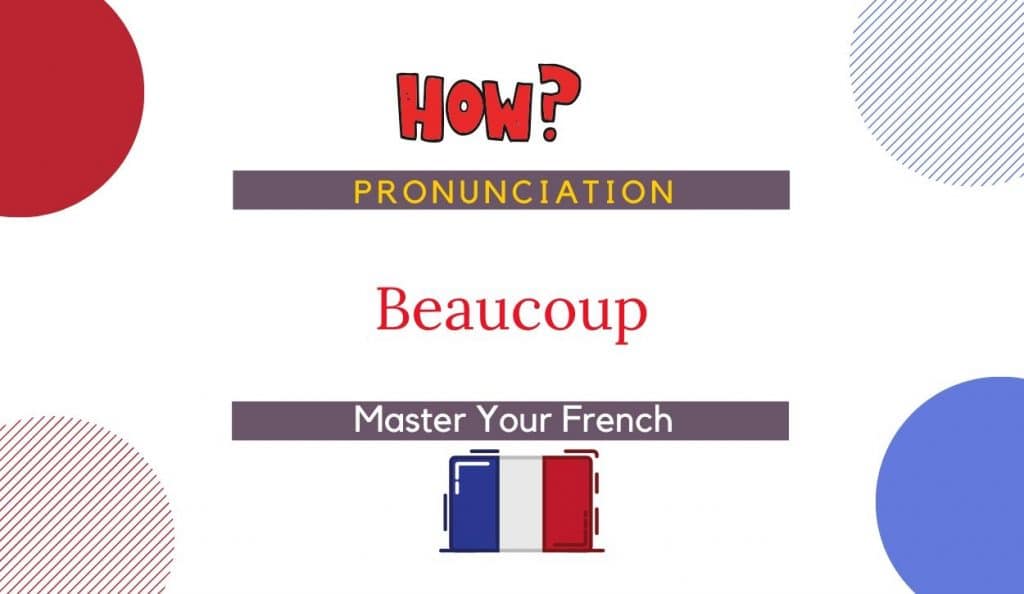How to pronounce Aujourd'hui in French?
Updated: 29 April, 2021 by Mylene in How to Pronounce ▪

Aujourd’hui in French
Aujourd’hui is an adverb in French that means today. In the word aujourd’hui, “hui” comes from Latin hodie that means aujourd’hui. So aujourd’hui literally means “on the day of this day”.
Example:
- Aujourd’hui il pleut!: Today, it’s raining!
- Je n’ai pas prévu d’aller chez le coiffeur aujourd’hui: I have no plans to go to the hairdresser today.
- Je pars en vacances aujourd’hui: I’m going on holiday today.
Check the video below to learn how to pronounce aujourd’hui in French. You’ll also find an infographic that lists words that are related to the time of the day in French.
How to pronounce “Aujourd’hui”?
In French, aujourd’hui is pronounced /oʒuʀdɥi/. In details:
- /o/ sound: The tongue is back, the mouth is open and the lips are rounded.
- /ʒ/ sound: Place the tip of your tongue at the front of the top of your mouth, behind where the /s/ is produced. Vibrate your vocal cords as you push air between the top of your mouth and the tip of your tongue.
- /u/ sound: The tongue is back, the mouth is slightly open and the lips are rounded.
- /r/ sound: The key to making /r/ is not letting the tip of your tongue touch the roof of your mouth. The tip of the tongue must touch the front lower teeth. Vibrate your vocal cords and let the airflow around and over your tongue.
- /ɥ/ sound: To make it, try to pronounce the /y/ sound first and then move very rapidly to pronounce the following vowel.
- /i/ sound: Your tongue should touch the front lower teeth. Your lips should be tensed, and the corners of your mouth slightly stretched apart. Your lips should only be slightly open. Your vocal cords vibrate.
- The letter h is not pronounced.
Note that the vowels “au” are always pronounced /o/.
This Instagram video will show you how to pronounce aujourd’hui in French.
Click the link to listen to this video or directly play the video shown below.
Using Aujourd’hui in French
Aujourd’hui is one of the words that you can use to speak in French about time or about current situations. “Today” is the most common use of this word in French.
In the following sections, we’ll go over the different meanings of aujourd’hui in French.
Speak About the date with aujourd’hui
The date is one of the first things you will learn in French:
- Quelle est la date aujourd’hui: What is the day today?
- Aujourd’hui c’est vendredi: Today is Friday.
When aujourd’hui means currently
The following two expressions have the same meaning: today, actually
- au jour d’aujourd’hui:
Au jour d’aujourd’hui nous ne savons pas si le marché va rouvrir: As per today we do not know if the market will open again. - à l’heure d’aujourd’hui:
A l’heure d’aujourd’hui je n’ai pas changé d’avis: For now, I didn’t change my mind.
The word aujourd’hui also means “these days” (actuellement).
- Les jeunes d’aujourd’hui sont différents.: Young people are different these days.
Speak about timeline with aujourd’hui
You can use one of the following sentences to speak about the timeline:
- jusqu’à aujourd’hui: until today
Jusqu’à aujourd’hui je ne savais pas ce que ça signifiait: Until today, I didn’t know what it meant. - à partir d’aujourd’hui. You can use this other expression: dorénavant.
A partir d’aujourd’hui je ne m’occupe plus de ce dossier: From today I no longer deal with this case.
Aujourd’hui is also used in many French idioms. Here is an idiom that uses both of the words aujourd’hui and demain:
- C’est pour aujourd’hui ou pour demain? : What are your waiting for?
Je t’attends depuis 1 heure, alors c’est pour aujourd’hui ou pour demain?. I’ve been waiting for you for one hour, what are you waiting for?
Another equivalent expression is “ça vient?” which is also a useful shorter version with the same meaning.
Sentences with words about time in French
If you need to be more specific, use one of the following sentences:
- Ce matin: This morning
Je me suis levée tôt ce matin: I woke up early this morning. - Ce midi: at noon
Je vais manger au restaurant ce midi: I’ll eat at the restaurant at noon. - Cet après-midi: this afternoon
Il devrait arriver cet après-midi: He should come this afternoon. - Ce soir: this evening
Mon frère rentre à la maison ce soir: My brother comes back home tonight. - Cette nuit: tonight
Je vais danser cette nuit: I’ll go dancing tonight. - avant-hier (J-2): the day before yesterday
Je suis allée au supermarché avant-hier: I went to the grocery store the day before yesterday. - hier (J-1): yesterday
Hier j’ai préparé un gâteau: I baked a cake yesterday. - demain: tomorrow
Demain je vais acheter ton cadeau: I’ll buy your present tomorrow. - après-demain: the day after tomorrow.
Après-demain nous irons nous promener dans la forêt: The day after tomorrow we will go for a walk in the forest.

Get a better French pronunciation
The French language contains a large number of words that are difficult to pronounce. To learn the right pronunciation of French words check our article on the pronunciation of French words.
To go beyond this effortless French pronunciation post, follow me on Instagram for daily French practice. Subscribe to my channel on YouTube and find more awesome French content on Pinterest.

